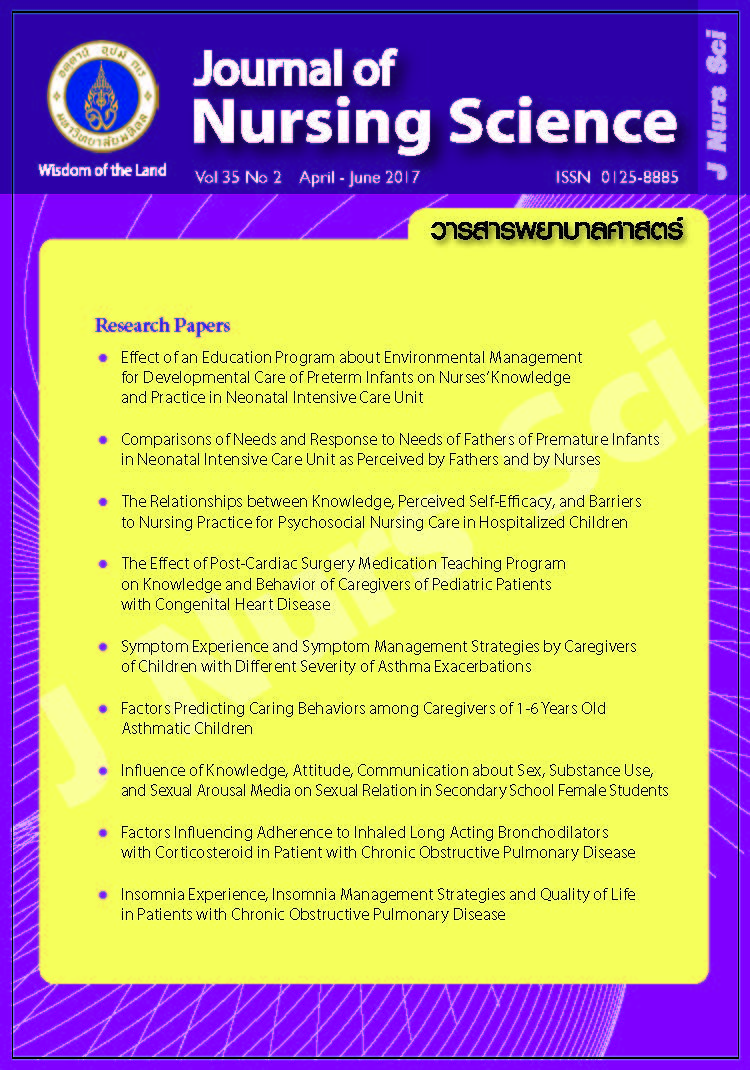Insomnia Experience, Insomnia Management Strategies and Quality of Life in Patients with Chronic Obstructive Pulmonary Disease
Main Article Content
Abstract
Abstract
Purpose: To investigate the insomnia experience, insomnia management strategies and
quality of life in persons with Chronic Obstructive Pulmonary Disease (COPD); to determine the correlations between insomnia experience and quality of life; and to determine the correlations between effective management of insomnia and quality of life.
Design: Descriptive correlational research.
Method: The purposive sample composed of 126 COPD patients in COPD Clinic of one tertiary hospital in Bangkok, Thailand. Data were collected using an insomnia severity index, an insomnia management strategies questionnaire, and a Short Form Survey (SF 12, Version 2) with Cronbach’s alpha coefficient at .85, .80 and .72 respectively. Data were analyzed using descriptive statistics and Pearson’s product moment correlation coefficient.
Main findings: All patients experienced one or more insomnia symptoms. The result revealed
that 50% of participants had mild insomnia experience. The management strategy used by most of the samples was well-ventilated rooms. The most effective insomnia management strategy to promote adequate sleep was exercise in the morning or evening. Overall quality of life and quality of life in terms of physical health was found to be poor (X = 45.82, SD = 5.56, X = 38.64, SD = 9.48, respectively). Insomnia symptom experience was negatively correlated with quality of life (r = - .195, p < .05). Furthermore, insomnia management efficiency was not correlated with quality of life (r = .151, p > .05).
Conclusion and recommendations: The findings suggested that nurses should pay attention on assessing insomnia experience and providing information to deal with insomnia to promote the quality of life in patients with COPD.
ประสบการณ์การมีอาการนอนไม่หลับ กลวิธีการจัดการกับอาการนอนไม่หลับ และคุณภาพชีวิตในผู้ป่วยโรคปอดอุดกั้นเรื้อรัง
บทคัดย่อ
วัตถุประสงค์: เพื่อศึกษาประสบการณ์การมีอาการนอนไม่หลับ กลวิธีการจัดการกับอาการนอนไม่หลับ คุณภาพ
ชีวิตผู้ป่วยปอดอุดกั้นเรื้อรังศึกษาความสัมพันธ์ระหว่างประสบการณ์การมีอาการนอนไม่หลับประสิทธิผลของการ
จัดการกับอาการนอนไม่หลับ และคุณภาพชีวิตในผู้ป่วยปอดอุดกั้นเรื้อรัง
รูปแบบการวิจัย: ศึกษาความสัมพันธ์เชิงพรรณนา
วิธีดำเนินการวิจัย: กลุ่มตัวอย่าง จำนวน 126 ราย เป็นผู้ป่วยที่มารับการรักษาที่คลินิกโรคปอดอุดกั้นเรื้อรังโรงพยาบาลตติยภูมิแห่งหนึ่งในกรุงเทพมหานคร เครื่องมือที่ใช้ในการเก็บข้อมูล ได้แก่ แบบประเมินอาการนอนไม่หลับ
แบบสัมภาษณ์วิธีการจัดการกับอาการนอนไม่หลับ และแบบประเมินคุณภาพชีวิต (SF-12) เวอร์ชั่น 2 มีค่าสัมประสิทธิ์
แอลฟาของครอนบาค เท่ากับ .85, .80 และ .72 ตามลำดับ วิเคราะห์โดยใช้สถิติพรรณนา และวิเคราะห์ความสัมพันธ์
โดยใช้สัมประสิทธิ์สหสัมพันธ์ของเพียร์สัน
ผลการวิจัย: พบว่าจากการคัดกรองประสบการณ์การมีอาการนอนไม่หลับเบื้องต้น กลุ่มตัวอย่างทุกคนมีประสบการณ์อาการนอนไม่หลับอย่างน้อย 1 อาการขึ้นไป กลุ่มตัวอย่าง ร้อยละ 50 มีอาการนอนไม่หลับระดับเล็กน้อย
กลวิธีการจัดการกับอาการนอนไม่หลับที่ปฏิบัติมากที่สุด คือ จัดห้องให้มีอากาศถ่ายเทได้สะดวก ส่วนกลวิธีการจัดการ
กับอาการนอนไม่หลับที่ช่วยให้นอนหลับได้เพียงพอมากที่สุด คือ ออกกำลังกายในช่วงเช้าหรือเย็น คุณภาพชีวิตโดยรวมและคุณภาพชีวิตด้านสุขภาพกายพบว่า อยู่ในระดับไม่ดี (X = 45.82, SD = 5.56, X = 38.64, SD = 9.48 ตามลำดับ) ประสบการณ์การมีอาการนอนไม่หลับมีความสัมพันธ์ทางลบกับคุณภาพชีวิตอย่างมีนัยสำคัญ (r = - .195, p < .05) และประสิทธิผลของการจัดการกับอาการนอนไม่หลับมีความสัมพันธ์กับคุณภาพชีวิตอย่างไม่มีนัยสำคัญทางสถิติ (r = .151, p > .05)
สรุปและข้อเสนอแนะ: จากผลการวิจัยครั้งนี้ พยาบาลควรประเมินอาการนอนไม่หลับของผู้ป่วย และวางแผนให้
ข้อมูลจัดการกับอาการนอนไม่หลับ เพื่อส่งเสริมคุณภาพชีวิตของผู้ป่วยปอดอุดกั้นเรื้อรังให้ดีขึ้น
คำสำคัญ : ผู้ป่วยปอดอุดกั้นเรื้อรัง ประสบการณ์อาการนอนไม่หลับ กลวิธีการจัดการกับอาการนอนไม่หลับ คุณภาพชีวิต
Article Details
Copyright Notice: Nursing Science Journal of Thailand has exclusive rights to publish and distribute the manuscript and all contents therein. Without the journal’s permission, the dissemination of the manuscript in another journal or online, and the reproduction of the manuscript for non-educational purpose are prohibited.

Disclaimer: The opinion expressed and figures provided in this journal, NSJT, are the sole responsibility of the authors. The editorial board bears no responsibility in this regard.

